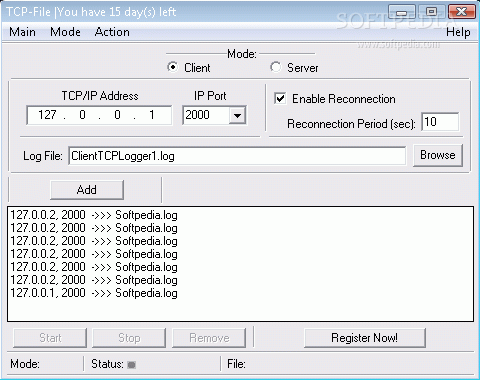TCP-File 1.5 Crack + Serial Number
TCP-File logs data received from any kind of equipment that has a TCP/IP address (for example, Cisco router).
TCP-File ComPort/IP Server combination allows you to record data received from remote serial ports exactly as Serial-File application does with local ports.

Download TCP-File Crack
| Software developer |
Fog Software, Inc.
|
| Grade |
1.9
905
1.9
|
| Downloads count | 7483 |
| File size | < 1 MB |
| Systems | Windows All |
TCP-File can be used to log data from one or more Terminal Servers to disk file(s).
A Terminal Server is a device that allows RS232 or RS485 serial devices to be connected to an Ethernet network.
Terminal Servers typically have an Ethernet connector and one or more RS232 or RS485 serial ports. Terminal Servers use TCP/IP network protocol to send the data transmitted via RS232 or RS485 serial port(s) to a given TCP/IP port. Each Terminal Server has its own IP address and sends all serial data to a specific TCP/IP port number.
Suppose you have one or more RS232 serial devices (e.g. scale, bar code scanner, PLC, telephone PBX system, etc.) and an Ethernet network connection and you want to log the data received from each serial device to a disk file on any computer connected to that network. Then all you have to do is purchase a Terminal Server (approx. $200.00), connect it to your local network and then connect all your serial devices to the Terminal Server.
Now run TCP-File on any PC connected to the local network and configure the program to connect to the Terminal Server and log the data transmitted by serial device(s) directly to a disk file located on this PC. It is all that simple!
Suppose you have a number of Programmable Logic Controllers (PLCs) connected via a TCP/IP network monitoring or controlling some process. Suppose the PLCs can transmit status or alarm messages to a TCP/IP port. With TCP-File it is possible to log all such messages to a local disk file!
Here are some key features of "TCP File":
■ Supports unlimited number of TCP/IP connections;
■ Capable of logging data received via each TCP/IP connection to an individual log-file;
■ Capable of logging data received via various TCP/IP connections to the same log-file;
■ Supports both client and server TCP/IP connections;
■ Supports multiple client connections simultaneously when configured to run as a TCP/IP server.
Limitations:
■ 15 days trial
